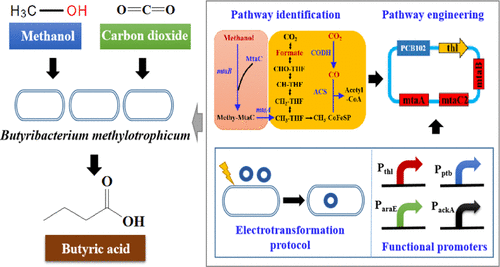当前位置:
X-MOL 学术
›
ACS Sustain. Chem. Eng.
›
论文详情
Our official English website, www.x-mol.net, welcomes your
feedback! (Note: you will need to create a separate account there.)
Methanol Assimilation with CO2 Reduction in Butyribacterium methylotrophicum and Development of Genetic Toolkits for Its Engineering
ACS Sustainable Chemistry & Engineering ( IF 7.1 ) Pub Date : 2021-08-28 , DOI: 10.1021/acssuschemeng.1c02365 Xin Wang 1 , Jialun Qin 1 , Chen Ma 1 , Jing Wang 1 , Xuelin Wang 1 , Sheng Xu 1 , Jiao Feng 1 , Kequan Chen 1 , Pingkai Ouyang 1
ACS Sustainable Chemistry & Engineering ( IF 7.1 ) Pub Date : 2021-08-28 , DOI: 10.1021/acssuschemeng.1c02365 Xin Wang 1 , Jialun Qin 1 , Chen Ma 1 , Jing Wang 1 , Xuelin Wang 1 , Sheng Xu 1 , Jiao Feng 1 , Kequan Chen 1 , Pingkai Ouyang 1
Affiliation

|
CO2-derived methanol is an attractive raw material for biobased production of value-added chemicals. Here, we investigated the native methylotrophButyribacterium methylotrophicum, which could synchronously assimilate methanol and CO2 to butyric acid anaerobically. Supplementation with an approximate amount of bicarbonate could improve methanol metabolism of B. methylotrophicum, and 2.04 g/L butyric acid was finally obtained from 100 mM methanol and 20 mM bicarbonate. The genes involved in methanol metabolism were further identified through homologous alignment and transcriptome analysis. The methyltransferase cluster along with genes of the carbonyl branch of the Wood–Ljungdahl pathway (WLP) was found to be transcriptionally activated for the assimilation of methanol and CO2. To engineer B. methylotrophicum, an efficient electrotransformation protocol and several functional promoters were subsequently developed. Following a systematic investigation of various parameters, the electrotransformation efficiency was increased to 3.2 × 103 transformants/μg DNA. The activities of four heterologous promoters including Pthl, ParaE, Pptb, and Padc were comparatively determined. With these genetic toolkits, transformants overexpressing genes associated with methyltransferase system or butyric acid synthesis were obtained, where methanol consumption was increased by 16.9 and 14%, and butyric acid production was increased by 13.8 and 28.6%, respectively, in methanol and CO2 medium. These results exhibit the great potential of B. methylotrophicum as a chassis for C1 bioconversion.
中文翻译:

甲基营养酪杆菌中 CO2 还原的甲醇同化及其工程遗传工具包的开发
CO 2衍生的甲醇是用于高附加值化学品的生物基生产的有吸引力的原材料。在这里,我们研究了天然的甲基营养型Butyribacteriummethylotrophicum,它可以在厌氧条件下同步将甲醇和CO 2同化为丁酸。补充大约量的碳酸氢盐可以改善甲基营养芽孢杆菌的甲醇代谢,最终从 100 mM 甲醇和 20 mM 碳酸氢盐中获得 2.04 g/L 丁酸。通过同源比对和转录组分析进一步鉴定了参与甲醇代谢的基因。发现甲基转移酶簇与 Wood-Ljungdahl 途径 (WLP) 的羰基分支基因一起被转录激活以吸收甲醇和 CO 2。为了设计甲基营养芽孢杆菌,随后开发了一种有效的电转化方案和几种功能性启动子。在对各种参数进行系统研究后,电转化效率提高到 3.2 × 10 3转化体/μg DNA。包括P在内的四种异源启动子的活性THL,P蛋白araE,P PTB,和P ADC进行对比来确定。使用这些遗传工具包,获得过表达与甲基转移酶系统或丁酸合成相关基因的转化体,其中甲醇消耗量增加了 16.9% 和 14%,丁酸产量分别增加了 13.8% 和 28.6%,在甲醇和 CO 2培养基中. 这些结果展示了甲基营养芽孢杆菌作为 C1 生物转化底盘的巨大潜力。
更新日期:2021-09-13
中文翻译:

甲基营养酪杆菌中 CO2 还原的甲醇同化及其工程遗传工具包的开发
CO 2衍生的甲醇是用于高附加值化学品的生物基生产的有吸引力的原材料。在这里,我们研究了天然的甲基营养型Butyribacteriummethylotrophicum,它可以在厌氧条件下同步将甲醇和CO 2同化为丁酸。补充大约量的碳酸氢盐可以改善甲基营养芽孢杆菌的甲醇代谢,最终从 100 mM 甲醇和 20 mM 碳酸氢盐中获得 2.04 g/L 丁酸。通过同源比对和转录组分析进一步鉴定了参与甲醇代谢的基因。发现甲基转移酶簇与 Wood-Ljungdahl 途径 (WLP) 的羰基分支基因一起被转录激活以吸收甲醇和 CO 2。为了设计甲基营养芽孢杆菌,随后开发了一种有效的电转化方案和几种功能性启动子。在对各种参数进行系统研究后,电转化效率提高到 3.2 × 10 3转化体/μg DNA。包括P在内的四种异源启动子的活性THL,P蛋白araE,P PTB,和P ADC进行对比来确定。使用这些遗传工具包,获得过表达与甲基转移酶系统或丁酸合成相关基因的转化体,其中甲醇消耗量增加了 16.9% 和 14%,丁酸产量分别增加了 13.8% 和 28.6%,在甲醇和 CO 2培养基中. 这些结果展示了甲基营养芽孢杆菌作为 C1 生物转化底盘的巨大潜力。











































 京公网安备 11010802027423号
京公网安备 11010802027423号